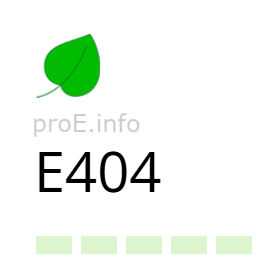
Other names for the additive (synonyms)
General Information
Calcium alginate (food additive E404) is the calcium salt of alginic acid, a natural polysaccharide found in the cell walls of brown seaweeds. In the food industry, additive E404 is used as a thickener, stabilizer, and gelling agent. It is valued for its ability to form strong gels resistant to heat and acids.
In nature, calcium salts of alginic acid are formed in the tissues of seaweeds of the genera Laminaria, Fucus, and Ascophyllum. For industrial production of additive E404, alginic acid is extracted from brown seaweeds and then treated with calcium compounds (most often calcium chloride or calcium carbonate).
The chemical formula of calcium alginate is (C6H7O6Ca)n. In appearance, additive E404 is a powder or granules of white or slightly cream color, poorly soluble in water, but readily forming gels in the presence of calcium ions. This property is the basis of its wide use in the food and pharmaceutical industries.
The main producers of calcium alginate are China, Japan, France, and the USA. Additional volumes are manufactured in the UK, Chile, and Norway. The demand for the additive is steadily growing due to its use not only in food technologies but also in medicine, biotechnology, and cosmetics.
Effects on the Body
Benefit of Additive E404
Like other salts of alginic acid (E400–E403), calcium alginate acts as an enterosorbent. It binds and removes heavy metals and radionuclides from the body, which makes it useful in conditions of increased exposure to toxins and radiation. Historically, alginates were considered radioprotective agents, especially in the 1970s–1980s.
Studies on animals and humans have shown that alginates may lower cholesterol levels and normalize lipid metabolism. This effect is associated with the formation of gels in the intestine that inhibit the absorption of fats and bile acids.
In clinical trials, alginates demonstrated the ability to reduce the glycemic response to carbohydrates, which makes them potentially useful in type 2 diabetes.
Another important property of calcium alginate is its ability to form strong gels in contact with calcium ions. This is applied not only in food technologies but also in medicine — for example, in the production of wound dressings and hemostatic agents that accelerate healing.
Risks of Additive E404
Overall, calcium alginate is considered a safe compound with low toxicity. In animal studies, administration of very high doses (grams per kilogram of body weight) resulted only in minimal changes in liver enzymes, which remained within normal limits.
In humans, excessive consumption may cause a mild laxative effect, as well as reduced absorption of calcium, iron, and zinc from food. Such effects are rare and occur when the acceptable daily intake is exceeded.
According to JECFA (FAO/WHO), the acceptable daily intake (ADI) for alginates is up to 50 mg/kg body weight. EFSA, in its 2017 evaluation, concluded that a numerical ADI was unnecessary since additive E404 at levels of use does not pose a health risk. However, for infants and young children, restrictions on concentrations in specialized formulas are recommended to avoid side effects.
Uses
Additive E404 is widely used in the food industry due to its ability to form thermostable gels. It is used:
- in the production of jellies, marmalade, candies, jams;
- in dairy products and desserts to stabilize texture;
- in meat and fish products (aspics, pâtés);
- in sauces and mayonnaise as a thickener;
- in beverages — to provide cloudiness and improve consistency.
In medicine, calcium alginate is used in wound dressings, as its gels have hemostatic properties and accelerate healing. In pharmaceuticals, it is applied to control the release rate of active ingredients in tablets and capsules.
In cosmetics, additive E404 serves as a stabilizer in creams, masks, and lotions, and is also used to produce alginate masks, popular in professional skin care.
Legal Status
In the European Union, additive E404 is included in the list of authorized substances under Regulation (EC) No 1333/2008. In 2017, EFSA confirmed its safety at declared levels of use. JECFA established an acceptable daily intake (ADI) for alginates of 50 mg/kg body weight.
In the United States, the Food and Drug Administration (FDA) classifies calcium alginate as GRAS (Generally Recognized As Safe). In Canada, Japan, Australia, and most countries worldwide, the additive is also permitted for use in the food industry.
In Ukraine and CIS countries, additive E404 is officially permitted. In Japan and China, calcium alginate is applied not only in food production but also actively introduced into medicine and cosmetology.